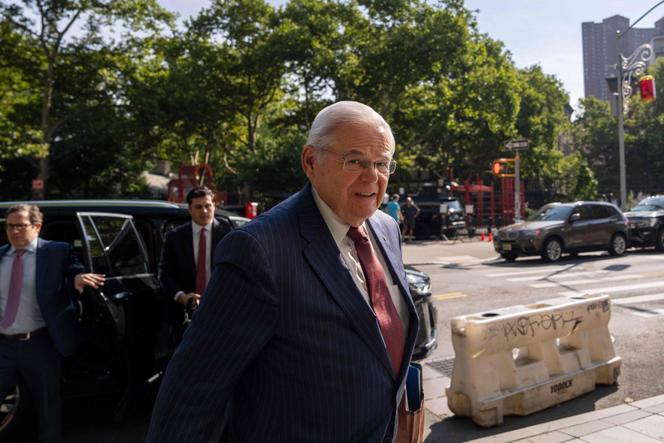


US Senator Bob Menendez was convicted on Tuesday, July 16, of all the counts he faced at his corruption trial, including accepting bribes of gold and cash from three New Jersey businessmen and acting as a foreign agent for the Egyptian government.
The jury’s verdict followed a nine-week trial in which prosecutors said the Democrat abused the power of his office to protect allies from criminal investigations and enrich associates, including his wife, through acts that included meeting with Egyptian intelligence officials and helping that country access millions of dollars in US military aid.
As the verdict was read in court, Menendez, 70, looked toward the jury at times as he appeared to mark a document in front of him. Afterward, he sat resting his chin against his closed hands, elbows on the table.
Menendez did not testify at the trial, but insisted publicly he was only doing his job as the chairman of the Senate Foreign Relations Committee. He said the gold bars found in his New Jersey home by the FBI belonged to his wife, Nadine Menendez. She too was charged but her trial was postponed so she could recover from breast cancer surgery. She has pleaded not guilty.
The verdict, delivered at a federal courthouse in Manhattan, comes four months before Election Day and potentially dooms Menendez’s chances of campaigning for re-election as an independent candidate.
Immediately after the verdict, Senate Majority Leader Chuck Schumer in a statement called on Menendez to resign. "In light of this guilty verdict, Senator Menendez must now do what is right for his constituents, the Senate, and our country, and resign," Schumer said.
The trial was the second time that the New Jersey Democrat has faced corruption allegations. An earlier prosecution on unrelated charges in 2017 ended with a deadlocked jury. His co-defendants, two New Jersey businessmen, were convicted of the charges they faced as well. All three had pleaded not guilty. Another businessman pleaded guilty before trial and testified against Menendez and the other defendants.
The jury’s decision is a culmination of a lengthy investigation that included a June 2022 FBI raid on the couple’s home in Englewood Cliffs, a wealthy community just across the Hudson River from New York City. In the home, FBI agents found gold bars worth nearly $150,000 and cash, mostly in stacks of $100 bills, totaling over $480,000. In the garage was a Mercedes-Benz convertible.
A supervising agent testified that he ordered the valuables seized because he suspected they might be the proceeds of a crime. Stacks of cash, he said, were found stuffed in boots, shoeboxes and jackets belonging to the senator.
At trial, prosecutors argued that the gold bars, cash and car were bribes. Defense lawyers disputed that, arguing that the gold belonged to his wife and she had kept him in the dark about financial troubles so grim that she nearly lost the home to foreclosure. They said the cash stemmed from the senator’s habitual hoarding of cash at home after hearing how his parents escaped Cuba in 1951 with only the cash they had hidden in a grandfather clock.
More shocking than the cash or gold, though, were allegations that Menendez had earned some of it by using his powerful perch on the Senate Foreign Relations Committee to take actions that benefited Egypt, an important US ally but one that is also often subject to American criticism over alleged human rights abuses.
Prosecutors said Nadine Menendez held herself out as a conduit to her powerful husband, exchanging texts with an Egyptian general and helping to arrange a Washington visit by the chief of Egypt’s intelligence service. To one general she texted, "Anytime you need anything you have my number and we will make everything happen."
Menendez, prosecutors said, took actions to ingratiate himself with Egyptian officials, including providing them with information about the staff at the US Embassy in Cairo and ghostwriting a letter to fellow senators encouraging them to lift a hold on $300 million in military aid to Egypt. The senator also told his wife to let her Egyptian contacts know that he planned to sign off on $99 million in tank ammunition.
Charges, originally announced last September, were expanded over time, eventually including bribery, extortion, fraud, obstruction of justice, conspiracy and, for Menendez, acting as a foreign agent of Egypt.
